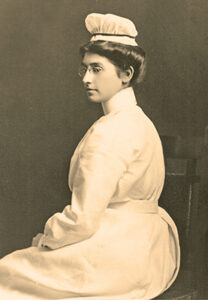Louise Dietrich (1878-1962) was a pioneer in the nursing profession in Texas and a leader of the women’s suffrage movement in El Paso. She was a charter member of the El Paso Equal Franchise League (EPEFL) and served in several key leadership roles. Dietrich was a professional nurse, who was the founder of the Texas Graduate Nurses Association. Her activism continued beyond the women’s suffrage movement. She was a founding member of the El Paso League of Women Voters and served as the president of the Texas League in the 1930s.
Anna Louise Dietrich was born on November 17, 1878 in Ossining, New York. She was one of 11 children of Mary Powell, a native of New Jersey, and Valentine Dietrich, a German immigrant.1 After high school, Dietrich attended Teacher’s College at Columbia University. When her father became ill with stomach cancer, she decided to study nursing to help with his care and trained at the Corcoran School of Nursing at St. John’s Hospital in Yonkers.2
Dietrich arrived in El Paso in 1902. She was traveling to California by train and stopped in El Paso for a visit where she found that an epidemic of typhoid fever was raging in the city. With only seven graduate nurses in El Paso, Dietrich stayed to help. In a 1935 interview, Dietrich said, “I came to El Paso in 1902 on the same train with Buffalo Bill. I stayed, and am still alive. He left and is dead.”3
She was joined in El Paso by her friend and fellow nurse from the Corcoran School of Nursing, Emily Dana Green. In those early years, Dietrich rode a horse to visit patients, including those at the tuberculosis tent city at Highland Park. Dietrich and Green initially worked and lived at Providence Hospital on North Santa Fe Street, with Green serving as the Supervisor of Nurses and Dietrich as the Superintendent of Nurses. By 1908, they had opened their own hospital, St. Mark’s Maternity Hospital at 1910 E. Wyoming Avenue with 10 beds. The women soon moved their hospital to 1401 East Nevada Avenue. By 1915, a third friend, Homoiselle R. Moss, who was a bookkeeper, joined them at the Nevada Avenue residence. There, the three friends lived together for almost 50 years.4
Dietrich was instrumental in the establishment of the nursing profession in Texas. She operated the first nurses’ registry in Texas at Providence Hospital and in 1903, founded the Texas Graduate Nurses’ Association, which was the first nursing organization in the state. Dietrich served in various capacities in that organization including general secretary from 1928 to 1954. Dietrich advocated for and helped pass the Nurses Compulsory Registration Bill in 1923 and was the first educational secretary for the Texas Board of Nurse Examiners. She was also the first Texas delegate to the American Nurses Association.5
Throughout her career as a nurse, Dietrich took a leading role in training student nurses. She was chairman of the Red Cross Nursing Service Committee from 1912 to 1915. During the First World War in 1916-1917, Dietrich was in charge of the Red Cross Teaching Centers in San Antonio and El Paso and organized the state’s Red Cross nursing, first aid and basic hygiene efforts for Texas troops. In the 1930s, she hosted a series of institutes in El Paso on the education of nurses and during World War II, helped recruit nurses for the war effort.6
Dietrich was a founding member of the El Paso Equal Franchise League (EPEFL), which was created in January 1915. She served as the corresponding secretary of the league in 1916 and 1917 and briefly served as president in 1918 before leaving for San Antonio during the war. Dietrich was a frequent contributor to editorials in El Paso newspapers in support of women’s suffrage. These editorials provide an insight into her views on women’s rights, which undoubtedly reflected the opinions of other suffragists. For example, Dietrich argued for the rights of single women in a 1916 editorial where she pointed out that women who had fathers, husbands, sons or brothers to provide for them and protect them did not realize the need for the vote as well as single women “alone in the world and earning her own living in competition with men.”7
A second area of concern for Dietrich was the health and welfare of children. Dietrich often spoke against the lack of funding from the Texas legislature for child welfare. At an April 1918 meeting of the EPEFL, she predicted that child mortality would rise during the war because of food shortages and rationing. Dietrich stated, “The majority of women are agreed that we no longer need politicians, but statesmen. The right to vote at the primaries is a power women should not overlook, and all women must register. We can choose men who have stood for what women have worked for, all these years, or else the sort that go along in the same old lines.”8
In 1918, Dietrich was appointed by Minnie Fisher Cunningham, the president of the Texas Equal Suffrage Association, to serve as El Paso County Chairman to help organize the El Paso region for suffrage and raise funds for the passage of the Susan B. Anthony Amendment. Texas women won partial suffrage in March 1918 when the state legislature passed a primary suffrage bill that gave women their first voting rights by allowing them to vote in Democratic primaries. As the County Chairman, Dietrich was active in mobilizing women to register and vote in the Democratic primary in July 1918. City newspapers consistently underestimated how many women would register with predictions starting at 1,000 and slowly increasing as it became apparent that the registration turnout was larger than expected. Dietrich accurately predicted from the beginning that the number of women registering would top 5,000 and vowed to quit politics if she were wrong. By the time the registration period closed, a total of 5,053 El Paso women had registered to vote.9
A year later on May 14, 1919, Texas held a referendum on women’s suffrage that would have amended the state constitution to give women full suffrage. For this campaign, Dietrich served as the Senatorial District Chairman for the El Paso State Senate District, which at that time included 25 counties in West Texas Although the May 1919 referendum was defeated by 25,000 votes statewide and Texas women did not win full suffrage until the ratification of the Nineteenth Amendment in August 1920, the fight to pass the referendum showed how effective suffragists had become as activists. Dietrich for her part, circulated a petition in El Paso County and claimed that 90% of all women in the district supported women’s suffrage.10
After ratification of the Nineteenth Amendment in 1920, the EPEFL became the El Paso League of Women Voters and the Texas Equal Suffrage Association became the Texas League of Women Voters. Dietrich was a charter member of both organizations and served as president of the Texas League of Women Voters from 1938 to 1940. Dietrich was the first president of the state league who traveled extensively throughout the state. Dietrich also ran for the Texas legislature in 1926 on a platform of “To Do for Others What She Would Have Them Do for Her.”11 Dietrich died on January 22, 1962 and is buried at Restlawn Cemetery in El Paso.
– Janine Young
Endnotes
- S. Census Bureau, 1910 U.S. Census, El Paso County, Texas, population schedule, El Paso, enumeration district 0076, FHL microfilm 1375562, retrieved from ancestry.com.
- American Red Cross Nurse Files, 1916-1959, retrieved from ancestry.com; Ann Carroll, “1st Maternity Hospital Brings Back Memories,” El Paso Herald Post, April 10, 1974, 15.
- “She Used to Ride Horseback to E.P. T.B. Tent City,” El Paso Herald Post, May 10, 1935, 7.
- Emily Green moved to California in the 1930s, but Dietrich and Moss continued living together until Dietrich’s death in 1962. “1st Maternity Hospital Brings Back Memories;” 1910 U.S. Census, El Paso County; U.S. Census Bureau, 1920 U.S. Census, El Paso County, Texas, population schedule, El Paso, enumeration district 0074, retrieved from ancestry.com; U.S. Census Bureau, 1930 U.S. Census, El Paso County, Texas, population schedule, El Paso, enumeration district 0054, FHL microfilm 2342063, retrieved from ancestry.com; S. Census Bureau, 1940 U.S. Census, El Paso County, Texas, population schedule, El Paso, enumeration district 256-11, retrieved from ancestry.com; Death Certificate of A. Louise Dietrich, Texas Department of State Health Services, Texas Death Certificates, 1903-1982, retrieved from ancestry.com; John F. Worley & Co.’s El Paso Directory for 1905, Dallas, Texas, https://texashistory.unt.edu/ark:/67531/metapth213976/: accessed November 11, 2020, University of North Texas Libraries, The Portal to Texas History, https://texashistory.unt.edu; crediting University of Texas at El Paso; John F. Worley Directory Company. El Paso Directory for 1908, Dallas, Texas, https://texashistory.unt.edu/ark:/67531/metapth285886/: accessed November 11, 2020, University of North Texas Libraries, The Portal to Texas History, https://texashistory.unt.edu; crediting University of Texas at El Paso; Eleanor L. M. Crowder, “Dietrich, A. Louise,” Handbook of Texas Online, Texas State Historical Association, https://www.tshaonline.org/handbook/entries/dietrich-a-louise.
- American Red Cross Nurse Files, 1916-1959; “She Used to Ride Horseback to E.P. T.B. Tent City,” “TGNA History 1907-1951,” box 1, folder 1, El Paso Graduate Nurses Association, C.L. Sonnichsen Special Collections Department, The University of Texas at El Paso Library; Crowder, “Dietrich, A. Louise.”
- “She Used to Ride Horseback to E.P. T.B. Tent City”; “Equal Franchise League to Renew Campaign for Trustee,” El Paso Herald, April 13, 1917, 9; Irene Evans, “Women of El Paso Responding in Generous Way to the Needs of Country in Its Preparedness Plan,” El Paso Herald, April 27, 1917, 12; Crowder, “Dietrich, A. Louise”; “Miss A. Louise Dietrich Conducts Nursing Institute,” El Paso Herald Post, November 21, 1938, 6.
- “Mrs. Critchett Heads Franchise League,” El Paso Morning Times, January 5, 2017, 7; Ruth Monro Augur, “Business Girls’ Gym Class To Boost Its Membership; Equal Suffrage Club Elects,” El Paso Herald, January 5, 1917, 8; “Miss Logan and Mrs. Raggio Make Reports on the State U.D.C. and National Suffrage Conventions to Their Local Organizations,” El Paso Herald, January 4, 1918, 8; “Mrs, Ernest A. Young Elected Head of El Paso Equal Franchise League,” El Paso Herald, January 18, 1918, 8; “Suffrage Leader is Guest of Honor at Luncheon and Talks,” El Paso Herald, March 18, 1916, 8.
- “Congressmen, Their Duties Discussed By Miss Dietrich at Franchise League,” El Paso Herald, April 19, 1918, 8.
- Louise Dietrich to Minnie Fisher Cunningham, December 31, 1915 and Minnie Fisher Cunningham to A. Louise Dietrich, box 9, folder 8, McCallum (Jane Y.) Papers, AR.E.004, 889-1957, Austin History Center, Austin Public Library, Austin Texas; “Equal Franchise League to Have Big French Booth at Festival of Allies,” El Paso Herald, September 27, 1918, 8; “Total Number Registrants Now Up to 1,931 Mark,” El Paso Morning Times, July 3, 1918, 5; “Cobb Lawn Party is Innovation in El Politics,” El Paso Morning Times, May 18, 1918, 10; “Final Total of Feminine Voters Recorded 5,053,” El Paso Morning Times, July 13, 1918, 5.
- Elizabeth Taylor, Citizens at Last: The Woman Suffrage Movement in Texas (Austin: Ellen C. Temple, 1987), 42, fn 77; Senatorial District Chairman list, undated, box 6, folder 5, McCallum Papers; “Suffrage Rally to be Held on Friday Night,” El Paso Herald, May 22, 1919, 2; “Suffragets to Work at Polls,” El Paso Herald, May 23, 1919, 5.
- Dorothy Brown, “Sixty Five Going on Fifty: A History of the League of Women Voters of Texas, 1903-1969.” League of Women Voters files, Austin, 1969, www.my.lwv.org/texas/history, accessed April 13, 2019; “Vote for A. Louise Dietrich,” undated flyer, box 8, folder 23, Belle Christie Critchett Papers, 1915 – 1968, MS 386, C.L. Sonnichsen Special Collections Department, The University of Texas at El Paso Library.

